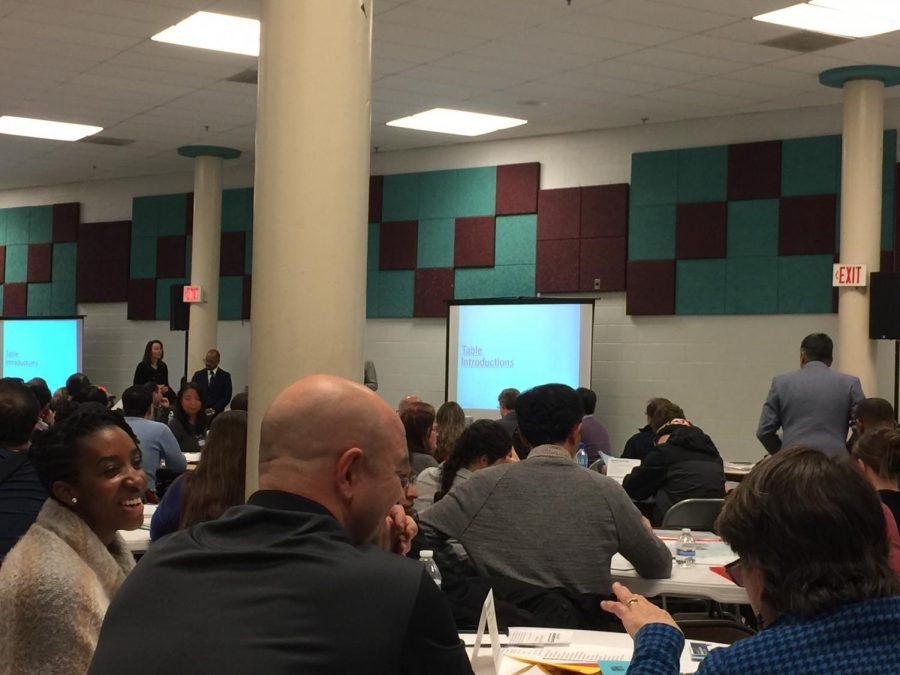MCPS boundary analysis report scheduled to release in spring 2021
January 7, 2021
Photo courtesy of Faith Cheung
During Phase I of the districtwide boundary analysis, parents attended a boundary analysis panel meeting at Northwest High School.
The release of the districtwide boundary analysis final report has been delayed until spring 2021 due to COVID-19 related difficulties, analysis consultants announced on Thursday, December 3. The release of the final report is now almost a year behind schedule, with the original release date being in June 2020.
According to an article by Bethesda Magazine, the final report will contain four data “simulations” that aim to improve capacity within school clusters and improve capacity concerns between neighboring schools, while increasing diversity and reducing distances students walk to school.
The final report will also detail school demographics, enrollment numbers, and data about the percentage of students who are able to walk to school, according to an article by WTOP.
Officials from the county’s consultant team, WXY Architecture + Urban Design, stated that the final report will not include recommendations on what boundaries to change or action to take.
However, the data presented in the final report will be used to guide future planning and action regarding school boundaries. The Board of Education plans to use the final report as a “critical data resource” that “allow[s] them to comprehensively understand district wide issues,” according to their website.
The districtwide boundary analysis first began in November 2019. The analysis is “an initiative designed to provide a comprehensive assessment of MCPS boundaries by analyzing data points, such as school facility utilization and capacity, student demographics and proximity to schools,” according to MCPS’s website.
The initiative consists of two phases: Phase I focused on community engagement and outreach and included a Board of Education (BOE) public hearing, open meetings held at various middle and high schools across the county, and 12 “targeted outreach sessions… with hard-to-reach communities and other key stakeholders.”
The county completed Phase I in March 2020, shortly after schools closed due to the pandemic. Afterwards, county officials released a 400-plus page interim report. The interim report included an in-depth analysis on school diversity and utilization and benchmark data from neighboring school districts.
During Phase II, which was completed in October 2020, WXY Architecture developed an “interactive boundary explorer,” an online tool that allows residents and stakeholders to further explore the boundaries of MCPS schools.
The explorer tool presents relevant data through three lenses: the utilization and capacity of school facilities, diversity in the student population, and the proximity of students to their schools.
“During the past 20 years, student enrollment … growth has helped MCPS become one of the largest and most diverse districts in the nation. Unfortunately, facility construction has not been able to keep pace with this significant growth. [As] a community, we are facing incredible opportunities and some tough decisions without easy answers,” BOE President Shebra L. Evans wrote in a letter prefacing the boundary analysis interim report.
The boundary analysis is viewed by the public as a highly controversial study and has received mixed feedback.
In January 2020, MCPS released comments and feedback about the boundary assessment. According to an article by NBC Washington, “an overwhelming majority of the comments are critical of the possibility of redrawing school boundaries.”
Parents expressed their concerns about busing children to different schools and its impact on an inclusive community, as well as the potentially negative effects on home and property values.
However, several student activist groups have vocally supported the completion of the boundary analysis, such as Montgomery County Students Toward Equitable Public Schools (MocoSTEPS) MocoSTEPS is a student-led coalition that aims to promote “diverse, equitable learning,” regardless of their location of residence or socioeconomic status.
“Passions can run high when there is a discussion on how resources are allocated,” Evans said in her letter.
